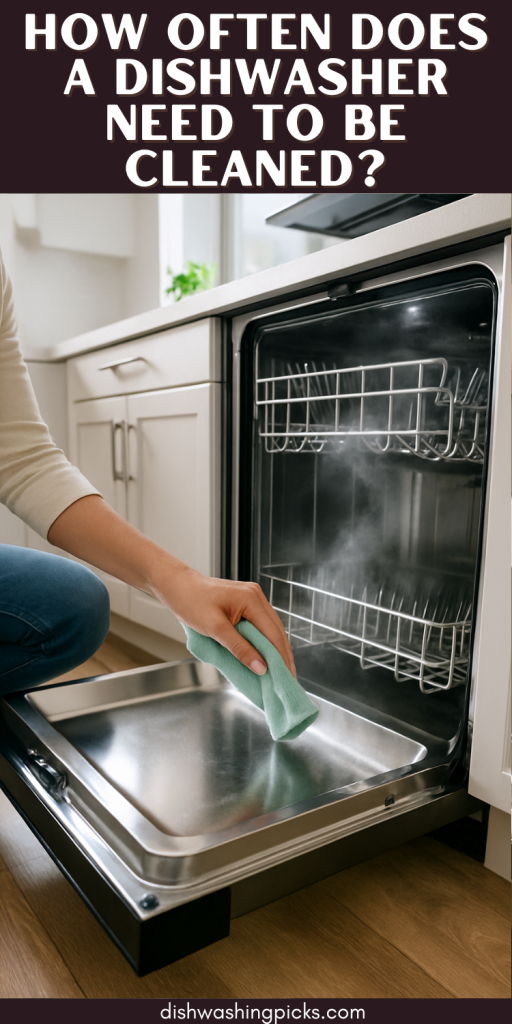
Why Clean Your Dishwasher Anyway?
So, here’s a question you probably never thought to ask: When was the last time you cleaned your dishwasher? I mean, it’s the machine that’s supposed to clean everything else, right? The irony isn’t lost on us. But just like any appliance, your trusty dishwasher needs a little TLC now and then. After all, how can it continue to work its magic if it’s got gunk and grime building up inside? You might be wondering, “How often do I need to clean my dishwasher, really?” Well, that’s what we’re here to answer.
Let’s dive into the nitty-gritty of how often you should be giving your dishwasher a deep clean, and why it’s just as important as washing the dishes themselves.
Why Does a Dishwasher Need Cleaning?
You know that feeling when you open the dishwasher, expecting to see sparkling clean dishes, but instead, you’re greeted by a weird smell or residue on your plates? Ugh, not exactly the “clean” you were hoping for. Here’s the deal: dishwashers get dirty, too. They deal with all sorts of food particles, soap scum, grease, and minerals from hard water. These can clog the spray arms, leave residue on your dishes, and, honestly, just cause a mess.
But don’t worry, you’re not alone in this. Most dishwashers have filters and drainage systems that catch debris, but they can only do so much. They still need regular cleaning to maintain peak performance.
How Often Should You Clean Your Dishwasher?
Alright, so you’re probably asking, “How often should I be cleaning my dishwasher?” The answer depends on a few factors, but here’s a general guideline:
- Once a Month: For most people, cleaning your dishwasher every month is a good baseline. This involves cleaning the filter, checking for any buildup in the spray arms, and running a cleaning cycle with a dishwasher cleaner or a vinegar rinse.
- If You Have Hard Water: If you live in an area with hard water (you know, the kind that leaves white spots on your glasses?), you might need to clean your dishwasher more frequently—like every two to three weeks. Hard water mineral deposits can build up quickly, causing clogs and leaving your dishes looking less-than-pristine.
- After Heavy Use: If you’ve been hosting dinner parties or running your dishwasher several times a day, it’s a good idea to clean it a little more often. Think of it as a car—you don’t wait for it to break down before you check the oil, right? Same goes for the dishwasher. If it’s been through a lot, give it some extra attention.
The Simple Steps to Clean Your Dishwasher
Now that we’ve got the timing down, let’s get into the how of cleaning your dishwasher. No need to get fancy or buy expensive products. Here’s what you can do in just a few easy steps:
- Clean the Filter: This is one of the most important steps. The filter catches a ton of debris that can clog up the machine over time. Simply remove the filter (check your manual if you’re unsure how) and rinse it under warm water. For stubborn buildup, scrub it with a soft brush.
- Clean the Spray Arms: The spray arms are responsible for distributing water during a wash cycle. If they’re clogged with gunk, they can’t do their job. Use a toothpick or small brush to clear any blockages in the holes of the spray arms.
- Run a Cleaning Cycle: There are special dishwasher cleaners available, but you can also use something simple like white vinegar. Place a cup of vinegar in the top rack and run the dishwasher on the hottest setting. This will help break down mineral deposits, soap scum, and other buildup.
- Wipe Down the Door and Seals: Don’t forget about the door and seals. Wipe down the rubber seals with a damp cloth to remove any mold or mildew. This can prevent funky smells from lingering.
Common Signs Your Dishwasher Needs Cleaning
Alright, so maybe you’re thinking, “Okay, I’ll get around to it, but how do I know when it’s really needed?” Well, here are a few telltale signs:
- Smelly Dishwasher: If your dishwasher starts to smell, it’s a clear sign that food particles and bacteria are building up.
- Dishes Aren’t Coming Out Clean: If you notice that your dishes are still dirty or have spots on them after a cycle, it could be a sign of clogged spray arms or a dirty filter.
- Water Isn’t Draining Properly: Slow drainage can be a sign that the filter or drain hose is blocked.
Keep It Clean, Keep It Running
In the end, cleaning your dishwasher might not be the most glamorous household chore, but it’s definitely one of the most important. A clean dishwasher works better, lasts longer, and ensures that your dishes come out sparkling every time. So, take a little time each month to show your dishwasher some love—and you’ll be rewarded with cleaner dishes and fewer headaches down the line.
Remember, a dishwasher is only as good as the care you give it. What’s your plan—are you setting a reminder for that monthly clean-up? Your dishwasher (and your dishes) will thank you!
